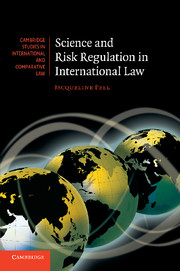Book contents
- Frontmatter
- Contents
- Preface
- Acknowledgements
- 1 Introduction: science and risk regulation in international law
- 2 Global risk governance and its legitimacy
- 3 Scientific rationality and risk in international law
- 4 Competing risk regulatory paradigms: sound science and the precautionary principle
- 5 Science and WTO regulation of SPS risk
- 6 Case studies of science and risk regulation in international law
- 7 Democratising global risk governance
- 8 What role for science in international risk regulation?
- Index
- CAMBRIDGE STUDIES IN INTERNATIONAL AND COMPARATIVE LAW
- References
8 - What role for science in international risk regulation?
Published online by Cambridge University Press: 10 January 2011
- Frontmatter
- Contents
- Preface
- Acknowledgements
- 1 Introduction: science and risk regulation in international law
- 2 Global risk governance and its legitimacy
- 3 Scientific rationality and risk in international law
- 4 Competing risk regulatory paradigms: sound science and the precautionary principle
- 5 Science and WTO regulation of SPS risk
- 6 Case studies of science and risk regulation in international law
- 7 Democratising global risk governance
- 8 What role for science in international risk regulation?
- Index
- CAMBRIDGE STUDIES IN INTERNATIONAL AND COMPARATIVE LAW
- References
Summary
Introduction
In an age of globalisation, when health and environmental problems are increasingly being identified on a global scale, it may seem paradoxical that one of the most intractable questions facing international law is how to ensure the regulation of risks in ways that will also accommodate local concerns and diverse risk perspectives. That the international law of risk regulation should have reached this point is a testament to the rapidity of its development from a system of primarily inter-governmental negotiation, implementation and adjudication to one embracing regimes of global governance with the capacity to penetrate deeply into national regulatory orders. The importance of risk management in contemporary societies, and the ease with which many health and environmental issues can be framed as global problems, seem set to ensure a central place for issues of risk in international law and associated governance structures. Concepts of risk and procedures for assessing and managing risk are already an established feature of international law in diverse fields such as international trade law, international environmental law, laws governing hazardous pollutants and food contaminants, and international climate change law.
Expectations for this system of global risk governance are high. On the one hand, it is anticipated that risk governance should deliver effective responses to globalised health and environmental risk problems that are developed on the basis of credible information. In this respect, science seems to offer optimal tools for international risk regulation.
- Type
- Chapter
- Information
- Science and Risk Regulation in International Law , pp. 376 - 388Publisher: Cambridge University PressPrint publication year: 2010



